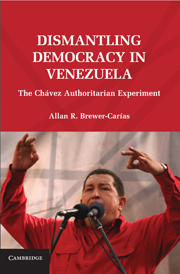Book contents
- Frontmatter
- Contents
- AUTHOR'S NOTE
- INTRODUCTION DEFRAUDING DEMOCRACY THROUGH NONCONSENSUAL CONSTITUENT ASSEMBLIES
- PART ONE THE POLITICAL ASSAULT ON STATE POWERS AND THE FRAMEWORK FOR AUTHORITARIANISM
- PART TWO INSTITUTIONAL DEVELOPMENT TOWARD CONSOLIDATING AUTHORITARIANISM
- Chapter 5 CONSTITUTIONAL FRAUD AND DEFRAUDING DEMOCRACY
- Chapter 6 THE REINFORCED CENTRALIZATION OF THE FEDERATION
- Chapter 7 CONCENTRATION OF POWERS AND AUTHORITARIAN GOVERNMENT
- Chapter 8 THE CATASTROPHIC DEPENDENCE AND POLITICAL SUBJECTION OF THE SUPREME TRIBUNAL OF JUSTICE
- Chapter 9 STATE APPROPRIATION, NATIONALIZATION, EXPROPRIATION, AND CONFISCATION OF PRIVATE ASSETS
- PART THREE CONSTITUTIONAL REFORMS DESIGNED TO CONSOLIDATE AUTHORITARIANISM
- INDEX
Chapter 5 - CONSTITUTIONAL FRAUD AND DEFRAUDING DEMOCRACY
Published online by Cambridge University Press: 05 June 2012
- Frontmatter
- Contents
- AUTHOR'S NOTE
- INTRODUCTION DEFRAUDING DEMOCRACY THROUGH NONCONSENSUAL CONSTITUENT ASSEMBLIES
- PART ONE THE POLITICAL ASSAULT ON STATE POWERS AND THE FRAMEWORK FOR AUTHORITARIANISM
- PART TWO INSTITUTIONAL DEVELOPMENT TOWARD CONSOLIDATING AUTHORITARIANISM
- Chapter 5 CONSTITUTIONAL FRAUD AND DEFRAUDING DEMOCRACY
- Chapter 6 THE REINFORCED CENTRALIZATION OF THE FEDERATION
- Chapter 7 CONCENTRATION OF POWERS AND AUTHORITARIAN GOVERNMENT
- Chapter 8 THE CATASTROPHIC DEPENDENCE AND POLITICAL SUBJECTION OF THE SUPREME TRIBUNAL OF JUSTICE
- Chapter 9 STATE APPROPRIATION, NATIONALIZATION, EXPROPRIATION, AND CONFISCATION OF PRIVATE ASSETS
- PART THREE CONSTITUTIONAL REFORMS DESIGNED TO CONSOLIDATE AUTHORITARIANISM
- INDEX
Summary
At the beginning of the twenty-first century, Latin America has witnessed in Venezuela the birth of a new model of authoritarian state that did not immediately originate in a military coup, as had occurred on many other occasions during the long decades of the previous century. In Venezuela, the authoritarian government has had its origin in popular elections, which despite its militaristic nature and its final goal of destroying representative democracy, have provided it the convenient camouflage of “constitutional” and “elective” marks.
We are talking about militarist authoritarianism with alleged popular support, like all fascist and communist authoritarianism regimes of the past century, in many cases with some electoral origin. Authoritarian political systems, no matter how constitutionally and electively disguised, cannot be democratic or considered to allow a state to be subject to the rule of law, particularly because they lack the essential components of democracy, which are much more than the sole popular or circumstantial election of governments.
POPULAR AUTHORITARIANISM AND CONCENTRATED STATE POWERS
In particular, among all the essential elements and components of democracy, the one regarding the separation and independence of public powers is maybe the most fundamental pillar of the rule of law, because it can allow other factors of democracy to become political reality.
- Type
- Chapter
- Information
- Dismantling Democracy in VenezuelaThe Chávez Authoritarian Experiment, pp. 167 - 197Publisher: Cambridge University PressPrint publication year: 2010



